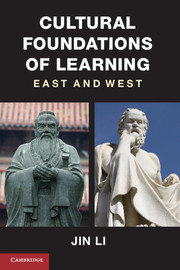Book contents
- Frontmatter
- Contents
- Preface
- 1 Faust and the Birth of a Research Agenda
- 2 Learning to Master the Universe and to Transform Self
- 3 Time Past and Time Present
- 4 Mind-Oriented and Virtue-Oriented Learning Processes
- 5 Curiosity Begets Inquiry and Heart Begets Dedication
- 6 Nerd’s Hell and Nerd’s Haven
- 7 Socratic and Confucian Tutors at Home
- 8 The Devil’s Advocate and the Reluctant Speaker
- 9 Implications for the Changing Landscape of Learning
- Bibliography
- Index
1 - Faust and the Birth of a Research Agenda
Published online by Cambridge University Press: 05 June 2012
- Frontmatter
- Contents
- Preface
- 1 Faust and the Birth of a Research Agenda
- 2 Learning to Master the Universe and to Transform Self
- 3 Time Past and Time Present
- 4 Mind-Oriented and Virtue-Oriented Learning Processes
- 5 Curiosity Begets Inquiry and Heart Begets Dedication
- 6 Nerd’s Hell and Nerd’s Haven
- 7 Socratic and Confucian Tutors at Home
- 8 The Devil’s Advocate and the Reluctant Speaker
- 9 Implications for the Changing Landscape of Learning
- Bibliography
- Index
Summary
ENCOUNTERING FAUST
Based on a real person, Dr. Faustus, who lived in Europe in the early sixteenth century, several artistic works combined to build the legend of Faust and the Faustian Bargain. Accordingly, Faust came to be known as a man who sought forbidden knowledge and made a bargain with the Devil. In exchange for his immortal soul, Faust would be given the power to know. The two best-known and most acclaimed renditions of the Faust tale were created by English playwright Christopher Marlowe and German poet Johann Wolfgang von Goethe. Marlowe dramatized the irrevocable nature of a pact signed in blood with the Devil, the frivolous and unsatisfying end to which the knowledge was put, and, finally, the passionate and desperate damnation that lay at the end of Faust’s search for “illegitimate power through learning.” Goethe in his mid-nineteenth-century geist modified the bargain and made it contingent on Faust’s having a moment of contentment. Goethe allowed the angels to rescue Faust because his search and aspiration never ceased. Faust triumphed in the end. Although these two literary works differ in their emphasis and form, they both kept the Faustian Bargain as the crux of their artistic vision.
Surprisingly, Goethe’s Faust was also translated, along with other important Western works, into Chinese, and therefore it served as an inspiration for a New Cultural Movement in China during the early twentieth century. My late mother remembered seeing the book as a middle-school girl in the 1930s in her school’s library in a rural Chinese town where only a few privileged children could attend school. She did dare to open this book with a strange title, but her desire to read further was put to rest for good because she could understand nothing.
- Type
- Chapter
- Information
- Cultural Foundations of LearningEast and West, pp. 1 - 19Publisher: Cambridge University PressPrint publication year: 2012



